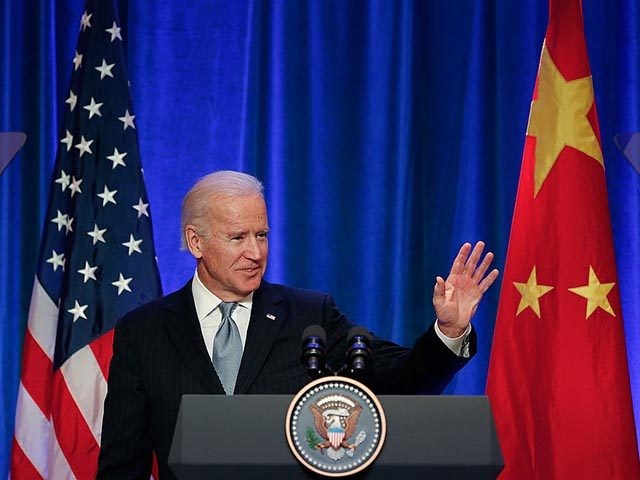China’s state-run media made numerous demands of Joe Biden on Wednesday in anticipation of his potentially becoming president, demanding changes to U.S. policy on the South China Sea, the Indo-Pacific region, and Taiwan.
China’s state-run Global Times told Biden to drop the whole concept of “Indo-Pacific” strategy and return to the Obama-Biden administration’s notion of an “Asia-Pacific” dominated by Beijing where the United States keeps a respectful distance:
The Obama administration coined the new term: rebalance to Asia-Pacific, a strategy that targets China, as he noted in his latest presidential memoir. The TPP that he initiated is also a key part of this strategy. However, the largest pillar of the idea of Asia-Pacific concept is still APEC, which holds annual summit and talks about cooperation. It largely balances US geopolitical maneuvers in the region. Therefore, people can feel more the constructive side about the “Asia-Pacific” concept.
By contrast, the term of “Indo-Pacific” has been very rudely transformed into a geopolitical concept by the Trump administration. Though the term is often put after an adjective of “free and open,” it is mostly used for China-targeted issues. The backbone of the Indo-Pacific concept is the Quadrilateral Security Dialogue between the US, Japan, India and Australia. Whenever they hold meetings or conduct military exercises, all media reports relate the events to China. There is no economic cooperation organization corresponding to “Indo-Pacific,” but only the military exercises and intelligence cooperation agreements that have played a role among the four countries. Taiwan authorities have repeatedly vowed to become part of the “Indo-Pacific strategy,” showing naked antagonistic ambitions.
By forcibly replacing the term “Asia-Pacific” with the term “Indo-Pacific” over the past few years, Washington has sought to divide the region, promote an anti-China alliance, and create a geopolitical climate in which all countries in the region must take sides. Except for a few forces willing to follow the US in order to increase their regional presence, most countries are very resistant to the pressure to take sides. They do not want to see the situation in the region evolve like this.
The Global Times instructed Biden to abandon President Donald Trump’s “reckless pursuit of the Indo-Pacific strategy” and stop “stirring up the region” with fantasies of opposing Beijing’s agenda. Instead, the Chinese Communist paper advised Biden to accept his “historic responsibility” to “explore and create an unprecedented win-win situation” in partnership with China.
Another Global Times article on Wednesday ordered Biden to back away from Trump’s enthusiastic support for Taiwan and return to the old “status quo” of “strategic ambiguity,” which basically means the United States talking about supporting Taiwan but not actually doing anything to antagonize or embarrass Beijing:
Biden will likely keep the status quo of the old policies. First, the policy of “strategic ambiguity” was formed by the US in its long-term handling of complex affairs across the Taiwan Straits. With the intensification of the strategic competition between China and the US, there will be both a competitive side and conflict risk mitigation mechanism in US policy. One of the Biden administration’s strategic goals will be avoiding involvement in a real military conflict and war against China in the Taiwan Straits, while simultaneously increasing involvement in cross-Straits affairs to delay its reunification process.
Judging from its policy orientation, Biden’s team does not approve of the Trump administration’s approach of frequently irritating China with high profile stunts that use Taiwan as a strategic chess piece. It prefers to maintain a relatively balanced situation across the Taiwan Straits. If the Biden administration moves from the policy of “strategic ambiguity” to “strategic clarity” and unilaterally expresses its clear assistance in defending Taiwan, it will undoubtedly create major tensions and turbulence across the Taiwan Straits. This will hinder the US from playing an “offshore balancing” act.
“An important consideration for the U.S.’ insistence on ‘strategic ambiguity’ is to avoid sending signals to Taiwan that the US will defend it unconditionally. To a certain extent, it restrains the ‘secessionist forces’ in Taiwan from promoting separatist activities. This is done in order to prevent the U.S. from becoming involved in a conflict or war against China,” the Global Times concluded, delivering an unsubtle threat to the incoming administration.

COMMENTS
Please let us know if you're having issues with commenting.